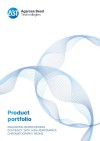Agarose Bead Technologies (ABT) is a premier manufacturer of high-quality agarose resins with locations in the US and Europe. The agarose resins, manufactured under a rigorous quality management system (QMS), are used in chromatographic purification, separation, or immobilisation processes of biomolecules including proteins, antibodies, enzymes, and oligonucleotides in discovery, development, and cGMP production of biopharmaceuticals.
ABT owns a proprietary agarose-based resin technology to develop a wide range of non-activated agarose beads for SEC and activation procedures, activated agarose beads for Affinity and IEX chromatography, as well as pre-activated resins for coupling of affinity ligands.
ABT custom products are made in compliance with client specifications on a large scale – a unique capability in the industry. ABT is an ISO 9001:2015 certified company with cGMP facilities operated by experts with in-depth knowledge of agarose.
See the Products Available:

Size Exclusion Chromatography
ABT offers a wide range of plain and crosslinked agarose beads with different agarose concentrations (2, 4, 6, 8, & 10%) in different particle distributions:
- Standard (50-150µm),
- Fine (20-50µm),
- and Macro (150-350µm).
ABT has also developed Rapid Run™ which are based on highly crosslinked 4% and 6% agarose matrices used for industrial scale separations.

Ion Exchange Chromatography
Ion Exchange Chromatography (IEX) separates biomolecules based on their net surface charge. Biomolecules will provide different interaction properties depending on the net charge, density, and surface charge distribution.
Depending on the working pH, the biomolecule will exhibit interaction to anion or cation exchanger media. Therefore, at a pH above its isoelectric point (pI), the biomolecule will interact with a positively charged resin (anion exchanger), and at a pH below its pI, the biomolecule will show affinity to a negatively charged resin (cation exchanger).

Affinity Chromatography
Affinity Chromatography is a technique that separates tagged proteins and other biomolecules using biological interactions. This technique has high selectivity and is widely used to obtain proteins with high purity at high yields. ABT manufactures a variety of activated beads used for His-tag, Antibody, GST, and Avidin/Streptavidin Purifications.

Affinity Coupling
ABT offers a great range of pre-activated resins that are designed to couple ligands via stable & uncharged covalent linkages that minimise leakage of the affinity ligand and reduce non-specific binding.
Two different chemistries of pre-activated beads are available: Glyoxal and Aminoethyl beads.
The choice of Glyoxal or Aminoethyl will depend on the ligand to be immobilised, the accessibility of the reactive groups and the direction/orientation required for the binding to the support.

Magnetics
Magnetic separation is a fast and broad use method for a variety of biomolecules bench-top purifications.
Magnetic agarose resins offer a simplistic purification step due to their ferrimagnetic formulation properties; the same ligand coupling chemistry as conventional agarose beads, being suitable for a wide range of applications.
ABT offers plain agarose beads (4% concentration) with the option of two particle sizes for magnetic separation procedures.

Columns
ABT offers chromatography accessories for working with small volumes of resins. The selection will depend on the equipment available in the purification step and the quantity of sample that needs to be purified.
These single-use chromatography tools, which simplify the use of the resins and make the purification process simple and rapid.
Customised Agarose Resins
The customisation of agarose resins is ABT's flagship service, and they develop various custom resins that meet the unique challenges of their clients.
ABT's custom product range is the result of their extensive research, expertise, and production technology capabilities with precision control of various parameters. Their custom range also includes agarose beads of various sizes with appropriate separation properties.
Parameters that can be specified:
- Size of beads
- Degree of crosslinking
- Pore size
- Concentration of agarose
- Spacer arm length
- Type of activation
- Density of active groups
Caltag Medsystems is here to support you every step of the way with your ABT custom projects.


